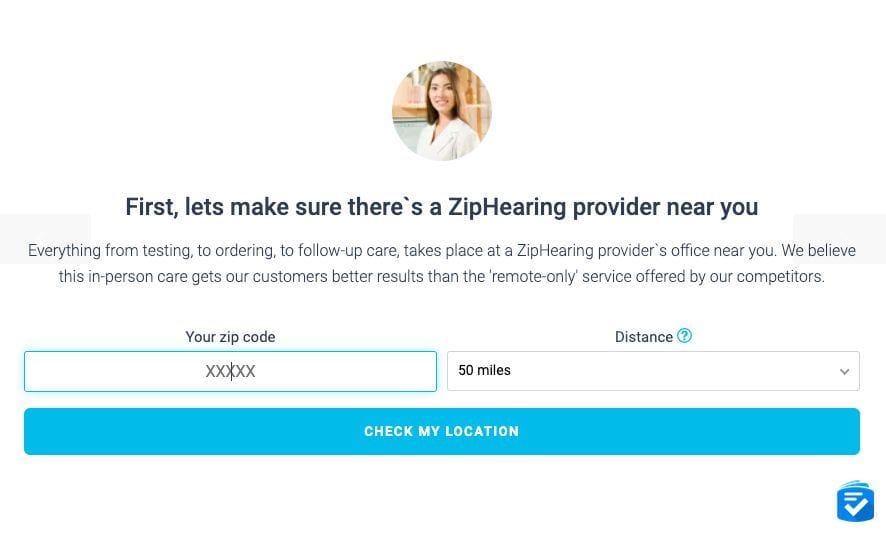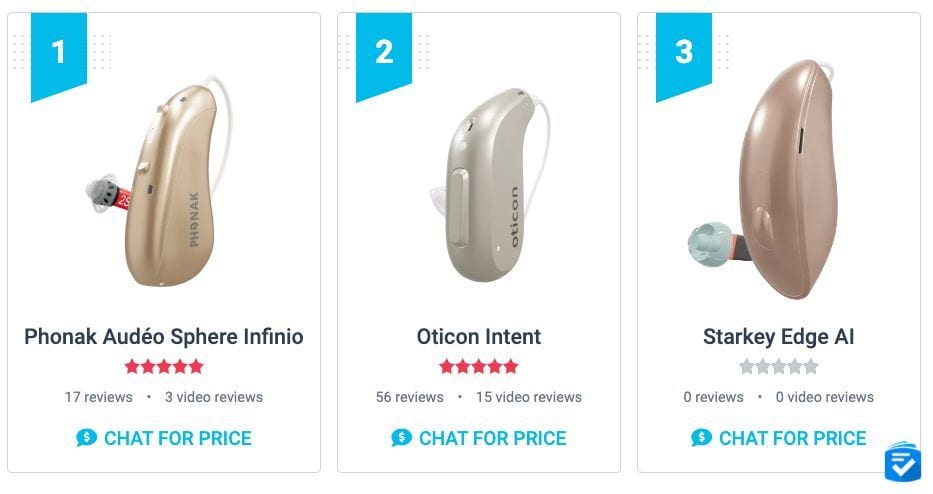
ZipHearing Review: 2025 Ratings and Pricing


By partnering with an extensive network of audiologists, ZipHearing provides in-person hearing health care while minimizing the high costs of hearing aids. The company’s prices are not as low as over-the-counter (OTC) hearing aid brands. However, ZipHearing offers a solid customer experience that will likely cost less than going directly to your local hearing health center.
Pro Tip: To learn more about our favorite hearing aid brands, read our guide to this year’s top-rated hearing aids.

ZipHearing Pros and Cons
Pros
- In-person assistance: ZipHearing has partnered with over 600 audiologists, so most Americans will have an in-person provider within nine miles. Many other hearing aid brands offer only telehealth services.
- More than a money-back guarantee: In addition to its 45-day trial, ZipHearing offers free tune-up appointments for the entire subsequent year. Also, it caps the cost of further visits at $50 per visit.
- Accessories included: ZipHearing includes supplies such as domes, wax fillers, and batteries. Plus, models with rechargeable batteries come with a charger.
- Big brand devices: ZipHearing offers devices from the most widely known hearing aid brands, including Phonak, Signia, and Oticon.
Cons
- Higher prices: ZipHearing often costs less than the traditional hearing aid purchasing processes, but there are still far cheaper hearing aid brands.
- Insurance not accepted: If you rely on your insurance to cut costs on hearing health, be aware that ZipHearing does not accept insurance or Medicare Advantage plans.
Did You Know: Medicare Advantage plans often include coverage for hearing health. To learn more, check out our guide to the best free Medicare Advantage plans.
How ZipHearing Works

The process of working with ZipHearing is fairly straightforward. First, you call the company’s main line and provide the contact information for your local provider. One of ZipHearing’s 600-plus approved audiologists will walk you through your options before you decide whether to order.
If you choose to move forward, ZipHearing will program your new hearing aids to adhere to your custom hearing profile; you’ll have 45 days to decide if you’re satisfied with your order. During that window, you may want to take advantage of ZipHearing’s free follow-up appointments to fine-tune your new hearing aids. These appointments are totally free for one year and never exceed $50 per appointment after that.
Whether ZipHearing can provide the style of hearing aid you’re looking for at a price point that makes sense will most likely play a bigger role in your ultimate decision.
Which Hearing Aids Does ZipHearing Sell?
ZipHearing offers a variety of quality brands and styles, including Phonak, Oticon, Signia,
Starkey, Widex, and Resound. By partnering with these brands, the company incorporates Bluetooth technology, rechargeable batteries, and invisible styles for a sleeker look.
The highest-rated model is the Starkey Evolv AI, which uses AI-based analysis to automatically make over 50 million adjustments every hour. It’s one of the highest-tech models, and it’s just one example of the numerous brands and models ZipHearing offers.
ZipHearing Costs
The average cost of hearing aids is between $4,000 and $6,000. ZipHearing offers its rechargeable, invisible, and Bluetooth styles at relatively affordable prices — starting as low as $999. The company’s average costs, however, are around $4,500.
ZipHearing does not accept insurance. Any coverage would be through reimbursement, so you’d still be responsible for the upfront cost. With average prices at the lower end of the national average, however, ZipHearing has a slight pricing advantage. It also offers a wide range of options for people looking for a much lower price point.
ZipHearing offers a 45-day money-back guarantee. So, you can rest assured you’ll have time to make sure you love your new hearing aids. During the 45-day period — and for the entire first year — any and all follow-up appointments will be fully covered. If you need assistance or maintenance after the first year, as mentioned above, ZipHearing caps the cost of the appointments at $50. It also offers an extended three-year warranty for loss or damage, but the policy is subject to a $350 deductible.
The average cost of hearing aids is between $4,000 and $6,000. ZipHearing offers its rechargeable, invisible, and Bluetooth styles at relatively affordable prices, starting as low as $999. The company’s average costs, however, are around $4,500.
Bottom Line
ZipHearing offers a straightforward way to get hearing aids at a reasonable cost. It doesn’t offer the lowest prices overall, but it focuses on transparency, quality, and customer service.
The company’s literature emphasizes its grounded, “straight-shooter” attitude while remaining informative and detailed. If you’re looking for a service that will guide you through the process at every step with a no-nonsense approach, ZipHearing may be right for you.
If you’re looking for a more affordable pair of hearing aids, read our guide to the best OTC hearing aids.
ZipHearing Frequently Asked Questions
-
Does ZipHearing take insurance?
ZipHearing does not take insurance. But, it is able to provide paperwork for reimbursement if your insurance has out-of-network benefits. Speak with an insurance representative if you’re unsure whether your policy offers benefits.
-
Does ZipHearing offer the cheapest hearing aids?
No. ZipHearing’s prices, however, are at the lower end of the national average cost.
-
Does ZipHearing have in-person stores?
No. Rather than having its own locations, ZipHearing partners with over 600 audiologists to make sure you have care on a local level.
